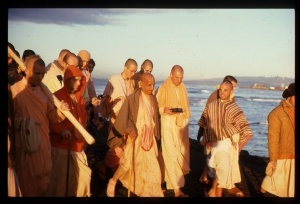CC Madhya 24.60: Difference between revisions
m (1 revision(s)) |
(No difference)
|
Revision as of 16:02, 20 March 2008

A.C. Bhaktivedanta Swami Prabhupada
TEXT 60
yaiche taiche yohi kohi karaye smaraṇa
cāri-vidha tāpa tāra kare saṁharaṇa
SYNONYMS
yaiche taiche—somehow or other; yohi kohi—anywhere and everywhere; karaye smaraṇa—remembers; cāri-vidha—the four kinds; tāpa—miserable conditions of life; tāra—of the devotee; kare saṁharaṇa—He takes away.
TRANSLATION
“When the devotee somehow or other always remembers the Supreme Personality of Godhead anywhere and everywhere, Lord Hari takes away life’s four miserable conditions.
PURPORT
The four miserable conditions are due to the four kinds of sinful activities, known as (1) pātaka, (2) uru-pātaka, (3) mahā-pātaka and (4) ati-pātaka—preliminary sin, very great sin, greater sin and topmost sin. However, Kṛṣṇa assures the devotee, ahaṁ tvāṁ sarva-pāpebhyo mokṣayiṣyāmi mā śucaḥ: (BG 18.66) “I will protect you from all sinful reactions. Do not fear.” The word sarva-pāpebhyaḥ indicates four kinds of sinful activities. As soon as the devotee surrenders unto Kṛṣṇa’s lotus feet, he is certainly relieved from all sinful activities and their results. The four basic sinful activities are summarized as illicit sex, intoxication, gambling and meat-eating.